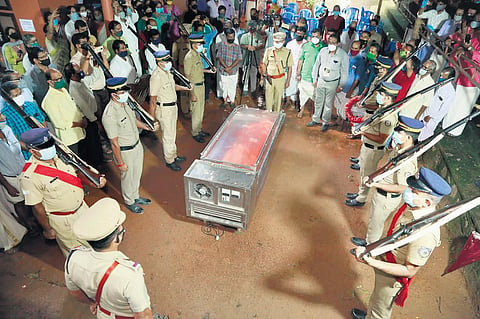

KOZHIKODE: Akkitham was 13 years older than the Communist party in Kerala. The poet, once identified as a fellow communist traveller, later distanced himself after the CPI adopted armed struggle as a policy in 1948. Anguished, the poet penned 'Irupatham Noottandinte Ithihasam', which is considered as his masterpiece.
In his youth, Akkitham was close to communist leader EMS Namboothiripad and renaissance leaders such as V T Bhattathiripad and M R Bhattathiripad. In fact, it was Akkitham who wrote the first few chapters of EMS's autobiography.
At the same time, Mahatma Gandhi was his ideal personality, a value he imbibed from his literary mentor Edasserry and V T Bhattathiripad. "Rather than politics, Akkitham's affinity was towards social reform during the period," observed social critic M N Karasserry.
Akkitham was attracted by the concept of socialism, which he took to heart from his childhood days spent learning the Vedas.
Calcutta Thesis
In February 1948, the CPI adopted armed revolution as its party programme at the second party Congress held in Calcutta. Buoyed by the peasants of Telangana seizing farmland from oppressive feudal landlords through armed struggle, B T Ranadive proposed the line.
Two years later, communists attacked the Edappally police station on February 28, killing two cops. Akkitham couldn't stand the violent path of the ideology he believed in. Pained and anguished, he wrote Irupatham Noottandinte Ithihasam.
"Thokkinum Vaalinum Vendi Chelavittorirumbukal Urukki varthedukkavoo balamulla Kalappakal" (Melt the iron you spent for guns and swords and make strong farmer's plough out of it), said the poet. "Ithihasam was against Calcutta Thesis," the poet himself had said.
"Ithihasam is an anti-communist poem. It definitely criticises the communist movement," said Karasserry. After the poem was published in 1951, the poet had to pay the price. He was heckled and showered with abuses by the communists.
Leaning right
The next turning point in Akkitham's life was his bonhomie with the Hindutva right wing, which provided the much needed acceptance to the latter in a Left-dominated cultural milieu of Kerala. A poet pained by the communist movement taking arms moving to the right wing, is the most paradoxical part in Akkitham's life.
He was identified with the right wing fold at least for a decade and served as an office-bearer of Thapasya -- the cultural wing of RSS. "Though he never responded in favour or against the right wing, the leaning was indelibly there," said writer N Prabhakaran.
When writer Paul Zachariya came out against Akkitham's saffron leanings, the poet remained calm and said Zachariya did not deserve a reply. "Akkitham was a great poet. His humane vision was formulated during his early years as a fellow communist traveller. The poet's later leaning to the right wing was unfortunate," said CPI leader and MP Binoy Vishwam.
Left buries the hatchet
Another noticeable thing in Akkitham's life was the Left camp trying to catch up with him, appreciating the literature and ignoring his politics.
He was conferred with state government's highest literary price, Ezhuthachan award, by the Pinarayi Vijayan government in 2016. "Way back in 1992, EMS declared that a writer doesn't need to be part of party politics. The Left came to terms and to hail the literary contributions of such widely accepted figures irrespective of their political leanings," said N Prabhakaran.